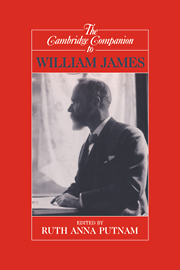Book contents
- Frontmatter
- Introduction
- 1 Pragmatism and introspective psychology
- 2 Consciousness as a pragmatist views it
- 3 John Dewey's naturalization of William James
- 4 James, Clifford, and the scientific conscience
- 5 Religious faith, intellectual responsibility, and romance
- 6 The breathtaking intimacy of the material world
- 7 James, aboutness, and his British critics
- 8 Logical principles and philosophical attitudes
- 9 James's theory of truth
- 10 The James/Royce dispute and the development of Jarnests "solution"
- 11 William James on religious experience
- 12 Interpreting the universe after a social analogy
- 13 Moral philosophy and the development of morality
- 14 Some of life's ideals
- 15 “A shelter of the mind”
- 16 The influence of William James on American culture
- 17 Pragmatism, politics, and the corridor
- 18 James and the Kantian tradition
- Bibliography
- Index
16 - The influence of William James on American culture
Published online by Cambridge University Press: 28 May 2006
- Frontmatter
- Introduction
- 1 Pragmatism and introspective psychology
- 2 Consciousness as a pragmatist views it
- 3 John Dewey's naturalization of William James
- 4 James, Clifford, and the scientific conscience
- 5 Religious faith, intellectual responsibility, and romance
- 6 The breathtaking intimacy of the material world
- 7 James, aboutness, and his British critics
- 8 Logical principles and philosophical attitudes
- 9 James's theory of truth
- 10 The James/Royce dispute and the development of Jarnests "solution"
- 11 William James on religious experience
- 12 Interpreting the universe after a social analogy
- 13 Moral philosophy and the development of morality
- 14 Some of life's ideals
- 15 “A shelter of the mind”
- 16 The influence of William James on American culture
- 17 Pragmatism, politics, and the corridor
- 18 James and the Kantian tradition
- Bibliography
- Index
Summary
“The turning was due to William James.” W. E. B. Du Bois here recalls, in his autobiography Dusk of Dawn (1940), that his favorite Harvard professor encouraged him to move from studying philosophy to history and social problems (Du Bois 1986, 582). But, more important, this short sentence neatly distills James's catalytic impact not only on Du Bois but on two generations of Harvard students. The act of turning is Jamests most characteristic move, be it found in the turning or troping of words as “in itself an act of power over meanings already in place,” or as it animates the pragmatist's emblematic stance (Poirier 1987, 17). In James's famous words, the pragmatist “turns his back resolutely. . . upon a lot of inveterate habits dear to professional philosophers. He turns away from abstraction . . . from verbal solutions, fixed principles, closed systems, and pretended absolutes and origins. He turns toward” facts, action, and power (P, 31).
A remarkable number of American intellectuals responded to James's invitation to turn. He directly influenced two generations of his Harvard students: Du Bois, Gertrude Stein, Walter Lippmann, the sociologist Robert Park, the philosopher Alain Locke, Robert Frost, the jurist Learned Hand, and the cultural philosopher Horace Kallen. He also shaped the thinking of young contemporary admirers like the socialists Harold Laski, William English Walling, and Randolph Bourne, and, of course, younger pragmatists - John Dewey, George Herbert Mead, and Charles Cooley - and psychologists James Mark Baldwin and John B. Watson.
- Type
- Chapter
- Information
- The Cambridge Companion to William James , pp. 322 - 342Publisher: Cambridge University PressPrint publication year: 1997
- 17
- Cited by

